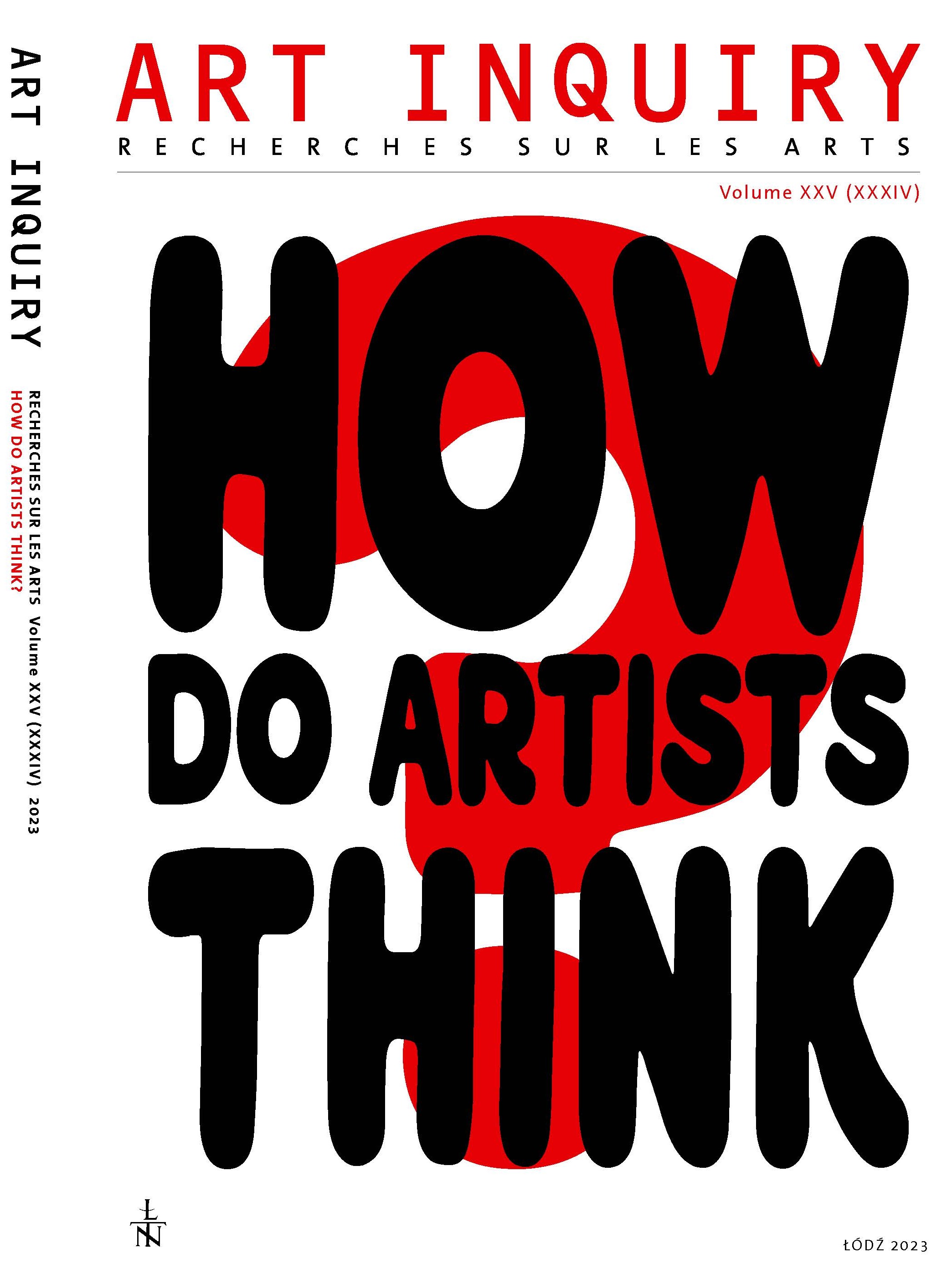Rethink thinking
DOI:
https://doi.org/10.26485/AI/2023/25/1Keywords:
esthetic thinking, philosophical thinking, artistic thinking, conceptual cognition, creation, art, esthetic experience, transformative experience, borderline situations, immediacy of cognition, sensuality.Abstract
The thinking of art creators is considered as part of philosophical reflection on cognit-ive processes. The author assumes that we are on the limit of the current vision of humanity, which induces us to attempt to "rethink thinking" and the meanings and functions attributed to thinking in cognitive processes. This attempt should include not only conceptual cognition but also "esthetic thinking" in the broad sense and "artistic thinking" connected, although not identical with it. The study examines what role could be played by the concept of "esthetic thinking" in the analysis of changes in art and its theories. The subject of interest is the turning points in thinking that could be connected with transformative experiences taking place in philosophy and art. Several possible directions of such analyses are presented that refer to historical and transformative experiences in thinking brought about by civilizational and technological transformations. Examples are provided of the transforming impact of similar experiences on theory and art.
References
Arendt H., Canovan M., The Human Condition, The University of Chicago Press, Chicago 1998, https://monoskop.org/images/e/e2/Arendt_Hannah_The_Human_Condition_2nd_1998.pdf, [accessed: 25.06.2023].
Arendt H., Myślenie, transl. by H. Buczyńska-Garewicz, Czytelnik, Warszawa 1981.
Auvray M., Fuchs Ph., Perception, immersion et interactions sensorimotrices en environnement virtuel, Intellectica, 2007/1, 45, pp. 23–35. https://intellectica.org/SiteArchives/archives/n45/45-1-Auvray.pdf [accessed: 24.01.2023].
Bachelard G., Kształtowanie umysłu naukowego. Przyczynek do psychoanalizy wiedzy obiektywnej, Wydawnictwo słowo/obraz terytoria, Gdańsk 2002.
Carel H., Kidd J., Expanding Transformative Experience, "European Journal of Philosophy", 2019, Expanding transformative experience – Carel – 2020 – European Journal of Philosophy – Wiley Online Library [accessed: 24.06.2023].
Czekaj R., Pisanie poezji po Buczy, czyli o konieczności reprezentacji estetycznej, [in:] Myślenie estetyczne, eds. T. Pękala, R. Kubicki, Wydawnictwo UMCS, Lublin 2023.
Deleuze G., Guattari F., Co to jest filozofia?, transl. by P. Pieniążek, Wydawnictwo słowo/obraz terytoria, Gdańsk 2000.
Descombes V., To samo i inne. Czterdzieści pięć lat filozofii francuskiej (1933-1978), transl. by B. Banasiak, K. Matuszewski, Wydawnictwo Spacja, Warszawa 1996.
Doda-Wyszyńska A., Pułapki przedstawienia. Filozofia przez pryzmat praktyk montażu pojęć, Wydawnictwo UAM, Poznań 2016.
Foucault M., "Aufklärung" i rewolucja, transl. by L. Wyczański, "Colloquia communia" 1986, no. 4-5.
Heidegger M., Koniec filozofii i zadanie myślenia, "Teksty: teoria literatury, krytyka, interpretacja" 1976, no. 4-5 (28-29), Wydawnictwo IBL PAN.
Kołakowski L., Obecność mitu, Wydawnictwo Dolnośląskie, Wrocław 1994.
Latour B., Nigdy nie byliśmy nowocześni. Studium z antropologii symetrycznej, transl. by M. Gdula, Oficyna Naukowa, Warszawa 2011.
Leszczyński D., Filozofia nauki Gastona Bachelarda, afterword: G. Bachelard, Kształtowanie umysłu naukowego. Przyczynek do psychoanalizy wiedzy obiektywnej, Wydawnictwo słowo/obraz terytoria, Gdańsk 2002.
Lorenc W., Obietnica sensu nawiązująca do sztuki. Theodora Adorna propozycja myślenia "solidarnego z metafizyką w momencie jej upadku", "Kultura Współczesna" 2001, no. 2-3 (28-29) 2001, eds. A. Jawłowska, A. Zeidler-Janiszewska, Warszawa 2001.
Lyotard J. F., Fenomenologia, transl. by J. Migasiński, KR, Warszawa 2000.
Mixed Realities. Neue Wirklichkeiten in der Kunst, "Kunstforum", 2023, no. 290.
Nervoplastica. Guy Ben-Ary. Sztuka biorobotyczna i jej konteksty kulturowe, ed. R. W. Kluszczyński, CSW Łaźnia, Gdańsk 2015.
Paul L. A., Transformative Experience, UOP Oxford 2016.
Pękala T., Estetyka jako filozofia pierwsza, "Kultura Współczesna" 2001, no. 2-3 (28-29), eds. A. Jawłowska, A. Zeidler-Janiszewska, Warszawa 2001.
Pękala T., Zadanie myślenia, in: Myślenie estetyczne, eds. T. Pękala, R. Kubicki, Wydawnictwo UMCS, Lublin 2023.
Piątek Z., Kondycja ludzka jako podstawa instrumentalnego stosunku człowieka do środowiska, "Diametros" 2006, no. 9.
Seel M., Estetyka obecności fenomenalnej, transl. by K. Krzemieniowa, Universitas, Kraków 2008.
Sobota D. R., Bycie czy byt? O dwóch podstawowych terminach filozofii Heideggera i problemach z ich polskimi przekładami, "Analiza i Egzystencja" 2015, no. 31.
Vattimo G., Społeczeństwo przejrzyste, transl. by M. Kamińska, Wydawnictwo Naukowe Dolnośląskiej Szkoły Wyższej Edukacji TWP, Wrocław 2006.
Weigel S., Poetics as a Presupposition of Philosophy: Hannah Arendt's "Denktagebuch", "Telos" 2009, no. 146.
Welsch W., Estetyka poza estetyką. O nową postać estetyki, transl. by. K. Guczalska, Universitas, Kraków 2005.
Downloads
Published
Issue
Section
License

This work is licensed under a Creative Commons Attribution-NonCommercial-NoDerivatives 4.0 International License.



